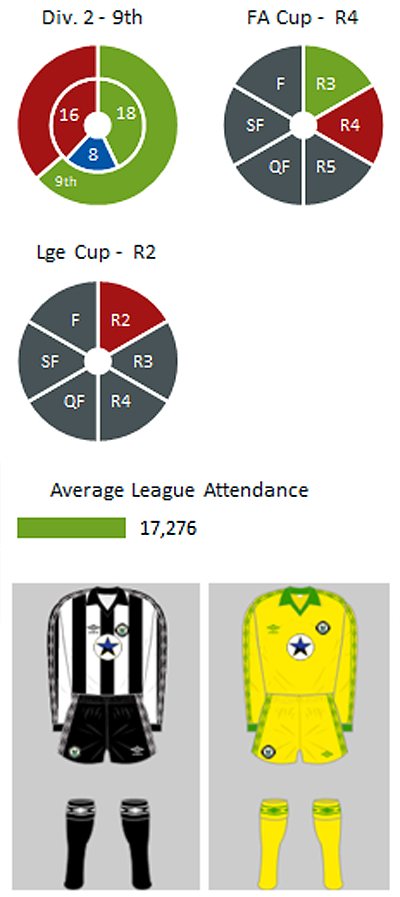
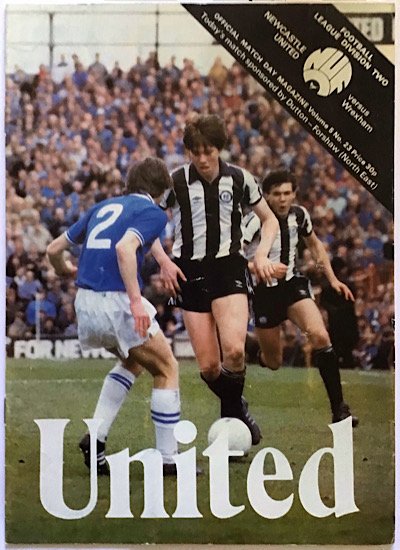
| Division 2 | 9th |
| FA Cup | R4 |
| League Cup | R2 |
| Attendance | 17,276 |
| Chairman | S Seymour |
| Manager | A Cox |
| Coach | T Cavanagh |
| Captain | M Martin |
| Top Scorer | I Varadi (20) |
Although it was another difficult season Chairman Seymour stated “there is now a totally different attitude at the club and amongst the players. We are no longer going backwards”.
Financially, the club was still in a very difficult situation and it was claimed that, as they had reached their overdraft ceiling, any player purchases had to be ratified by the bank. However, Seymour refuted rumours that United could not buy any players at all due to restrictions put on them by the banks.
1981/82 certainly saw some improvement in terms of the football on offer although some fans took time to adjust to the more possession based football introduced by new coach Tommy Cavanagh.
There were more goals (only 5 goalless draws and 14 blanks in all) and United were even in with a shout of promotion at Easter. But a disastrous end to the season saw them tumbling back into mid-table obscurity.
Hope came in the form of the emergence of Chris Waddle and the arrival of Imre Varadi. With Rafferty and Harford gone the speedy Londoner moved in at Number 9. A slow start (no goals in seven) brought fears of another dud, but a hat-trick at Ninian Park proved a turning point
Alan Brown arrived on loan from Sunderland and 3 goals in his first 2 home matches made him an instant hero. But either a lack of money or an injury meant that he wasn’t signed permanently and Cox took David Mills on loan until the end of the season.
With things gradually looking up a crowd of 26,994 turned up to see United beat Chelsea 1-0 at the end of March. A week later another one goal victory at Charlton saw The Magpies reach fourth. But just as it looked as if the corner had been turned, United lost six of the next seven games and plummeted down the table.
Grimsby and Fulham provided the usual early cup exits.
The supporters were clearly yet to be convinced. The average League attendance crept up to 17,276 and whenever there was a glimmer of hope four or five thousand disaffected fans would return, but the end of season collapse saw the attendance for the Wrexham home match dip below 10,000
Kit images copyright Historical Football Kits and reproduced by kind permission
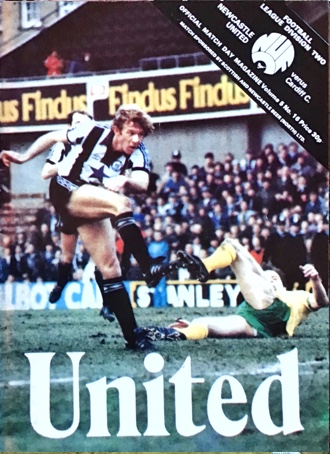
In the first season in which three points were awarded for a win the entertainment level increased and there were definite signs of improvement in United's League form from the previous campaign. Almost twice as many goals were scored, but in terms of results the difference was less striking: 4 more wins but 2 more defeats. And although the Magpies more than trebled their away goals tally they lost 2 more games. It was at home where the performances showed more improvement and - after losing their first game - they were unbeaten at St. James' until the end of April.
United recovered from losing 3 of the first 4 games to climb up to 10th by the turn of the year. They were being held back by terrible away form which brought 1 win and 7 defeats from 9 games.
Seven home wins on the trot propelled United up the table and after they won at Charlton on April 3rd (their 3rd win away from Tyneside) United had moved into 4th spot. They were 1 point behind Sheffield Wednesday, who held the third promotion spot, with a game in hand.
With United on an upward trajectory, a return to the First Division was very much a possibility. However, a disastrous collapse which brought only 1 point from the next 7 games followed.
| 29/8 | H | Watford | L | 0-1 | ||
| 05/9 | A | QPR | L | 0-3 | ||
| 12/9 | H | Cambridge | W | 1-0 | ||
| 19/9 | A | Norwich | L | 1-2 | ||
| 23/9 | H | Shrewsbury | W | 2-0 | ||
| 26/9 | H | Orient | W | 1-0 | H | |
| 29/9 | A | Bolton | L | 0-1 | ||
| 03/10 | A | Cardiff | W | 4-0 | ||
| 10/10 | H | Derby | W | 3-0 | ||
| 17/10 | A | Barnsley | L | 0-1 | H | |
| 24/10 | H | Rotherham | D | 1-1 | ||
| 31/10 | A | Oldham | L | 1-3 | ||
| 07/11 | A | Chelsea | L | 1-2 | ||
| 14/11 | H | Charlton | W | 4-1 | ||
| 21/11 | H | Luton | W | 3-2 | ||
| 24/11 | A | Orient | L | 0-1 | ||
| 28/11 | A | Grimsby | D | 1-1 | ||
| 05/12 | H | Blackburn | D | 0-0 | ||
| 16/1 | A | Watford | W | 3-2 | ||
| 30/1 | H | Norwich | W | 2-1 | ||
| 03/2 | H | Bolton | W | 2-0 | ||
| 06/2 | A | Cambridge | L | 0-1 | ||
| 13/2 | H | Cardiff | W | 2-1 | ||
| 20/2 | A | Shrewsbury | D | 0-0 | ||
| 24/2 | H | Sheff Wed | W | 1-0 | ||
| 27/2 | A | Derby | D | 2-2 | ||
| 02/3 | A | Leicester | L | 0-3 | ||
| 06/3 | H | Barnsley | W | 1-0 | ||
| 13/3 | A | Rotherham | D | 0-0 | ||
| 20/3 | H | Oldham | W | 2-0 | ||
| 27/3 | H | Chelsea | W | 1-0 | ||
| 31/3 | H | C Palace | D | 0-0 | ||
| 03/4 | A | Charlton | W | 1-0 | ||
| 06/4 | A | Wrexham | L | 2-4 | ||
| 10/4 | H | Leicester | D | 0-0 | ||
| 12/4 | A | Sheff Wed | L | 1-2 | ||
| 17/4 | A | Luton | L | 2-3 | H | |
| 24/4 | H | Grimsby | L | 0-1 | ||
| 01/5 | A | Blackburn | L | 1-4 | ||
| 05/5 | H | QPR | L | 0-4 | ||
| 08/5 | H | Wrexham | W | 4-2 | ||
| 15/5 | A | C Palace | W | 2-1 |
| W | D | L | F | A | Pts | ||
| 01 | Luton | 25 | 13 | 4 | 86 | 46 | 88 |
| 02 | Watford | 23 | 11 | 8 | 76 | 42 | 80 |
| 03 | Norwich | 22 | 5 | 15 | 64 | 50 | 71 |
| 04 | Sheff Wed | 20 | 10 | 12 | 55 | 51 | 70 |
| 05 | QPR | 21 | 6 | 15 | 65 | 43 | 69 |
| 06 | Barnsley | 19 | 10 | 13 | 59 | 41 | 67 |
| 07 | Rotherham | 20 | 7 | 15 | 66 | 54 | 67 |
| 08 | Leicester | 18 | 12 | 12 | 56 | 48 | 66 |
| 09 | Newcastle | 18 | 8 | 16 | 52 | 50 | 62 |
| 10 | Blackburn | 16 | 11 | 15 | 47 | 43 | 59 |
| 11 | Oldham | 15 | 14 | 13 | 50 | 51 | 59 |
| 12 | Chelsea | 15 | 12 | 15 | 60 | 60 | 57 |
| 13 | Charlton | 13 | 12 | 17 | 50 | 65 | 51 |
| 14 | Cambridge | 13 | 9 | 20 | 48 | 53 | 48 |
| 15 | C Palace | 13 | 9 | 20 | 34 | 45 | 48 |
| 16 | Derby | 12 | 12 | 18 | 53 | 68 | 48 |
| 17 | Grimsby | 11 | 13 | 18 | 53 | 65 | 46 |
| 18 | Shrewsbury | 11 | 13 | 18 | 37 | 57 | 46 |
| 19 | Bolton | 13 | 7 | 22 | 39 | 61 | 46 |
| 20 | Cardiff | 12 | 8 | 22 | 45 | 61 | 44 |
| 21 | Wrexham | 11 | 11 | 20 | 40 | 56 | 44 |
| 22 | Orient | 10 | 9 | 23 | 36 | 61 | 39 |
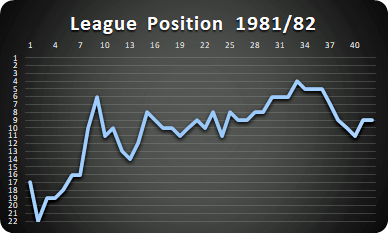

| 04/1 | R3 | H | Colchester United | D | 1-1 | ||
| 18/1 | R3r | A | Colchester United | W | 4-3 | ||
| 23/1 | R4 | H | Grimsby Town | L | 1-2 |
| 07/10 | R2 L1 | H | Fulham | L | 1-2 | ||
| 27/10 | R2 L2 | A | Fulham | L | 0-2 |
| Player | A | S | G |
|---|---|---|---|
| Barton D | 22 | 0 | 2 |
| Bell, D | 2 | 0 | |
| Brown, A | 5 | 0 | 3 |
| Brownlie J | 43 | 0 | 3 |
| Carney S | 30 | 1 | |
| Carr K | 47 | 0 | |
| Cartwright P | 16 | 1 | |
| Davies I | 15 | 0 | 2 |
| Ferris, P | 0 | 2 | |
| Haddock, P | 31 | 2 | |
| Halliday, B | 15 | 0 | |
| Martin M | 42 | 2 | |
| Mills, D | 23 | 0 | 4 |
| Pugh, K | 0 | 1 | |
| Saunders, W | 32 | 0 | 1 |
| Shinton B | 10 | 2 | 2 |
| Shoulder A | 4 | 9 | |
| Todd, K | 3 | 2 | 2 |
| Trewick, J | 45 | 0 | 6 |
| Varadi, I | 47 | 0 | 20 |
| Waddle, C | 47 | 0 | 8 |
| Walker, N | 5 | 0 | |
| Wharton, K | 33 | 5 | 5 |
| own goals | 1 |
Total number of games: 47
Total number of players used: 23
01: Carr
02: Brownlie
03: Davies > Saunders
04: Trewick
05: Barton > Carney
06: Halliday > Haddock
07: Shinton > Mills
08: Martin
09: Varadi
10: Wharton > Cartwright
11: Waddle
Top scorers: Varadi (20), Waddle (8) and Trewick (6).
| Name | Date | From | Fee |
|---|---|---|---|
| Saunders Wes | 06/81 | Professional | |
| Todd Kevin | 08/81 | Professional | |
| Varadi Imre | 08/81 | Everton | £125,000 |
| Bell Derek | 12/81 | Professional | |
| Hedworth Chris | 01/82 | Professional | |
| Harford Michael | 03/82 | Bristol City | Free |
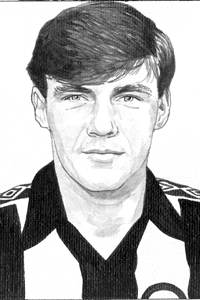
W Saunders
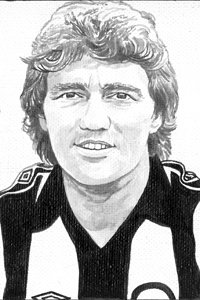
K Todd
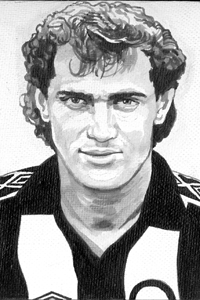
I Varadi
| Name | Date | To | Fee |
|---|---|---|---|
| Kelly Peter | 06/81 | Retired (inj.) | |
| Hibbitt Terry | 06/81 | Retired (inj.) | |
| Koenen Frank | 06/81 | De Treffers | |
| Sugget Colin | 06/81 | Retired | |
| Boam Stuart | 06/81 | Mansfield | Free |
| Clarke Ray | 08/81 | Retired (inj.) | |
| Harford Michael | 08/81 | Bristol City | £160,000 |
| Mitchell Ken | 08/81 | Darlington | Free |
| Nicholson Gary | 08/81 | Mansfield | £25,000 |
| Shinton Bobby | 03/82 | Millwall | Free |
| Harford Michael | 03/82 | Birmingham | £100,000 |
| Walker Nigel | 05/82 | San Diego | Free |
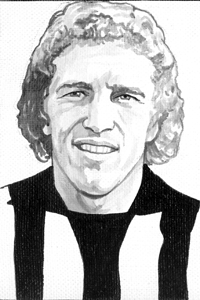
S Boam
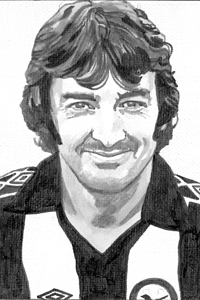
R Clarke
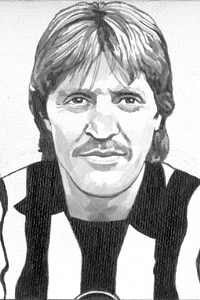
B Shinton
| Name | Date | To | Club |
|---|---|---|---|
| Brown Alan | 11/81 | 01/82 | Sunderland |
| Mills David | 01/82 | 05/82 | Sheff Wed |
| Name | Date | To | Club |
|---|---|---|---|
| Todd Kevin | Darlington | ||
| Walker Nigel | Plymouth | ||
| Shinton Bobby | 01/82 | 02/82 | Millwall |
At the start of the campaign it was reported that the club’s debts stood at £600,000 and they allegedly had only £25,000 in the kitty to buy new players,
It was also claimed that, as they had reached their overdraft ceiling, any player purchases had to be ratified by the bank. However, Seymour refuted rumours that United could not buy any more players due to restrictions put on them by the banks.
The accounts were released in November and revealed that for the year ending 31st July the club had made a loss of £877,381 and had net liabilities of almost £1m. They owed almost half a million to the bank and if they had withdrawn their support the club would have folded.
Seymour did not rule out the possibility of a share issue, but had doubts whether it would be successful.
To inject some new funds the Board recruited a new director to fill the vacant position on the Board. Talks were held with businessman Terry Liffen and they eventually appointed the owner of Moordale Coaches, Eddie Dunn.
Malcolm Dix was furious that he and the other nominee George Dickson had been overlooked. “To not even be approached by the Chairman on this occasion is an insult to everything I have fought for. I have campaigned for many years to bring about change. Since the exit of Lord Westwood, and Messrs Rutherford and Salkeld. I was content that Stan Seymour and the other six directors were trying their best to rectify the position. It makes me wonder whether the directors have changed that much”. NUSA founder Dix had been a shareholder since 1973, a nominee for the board since 1974 and was chairman of the Newcastle Sports Council.
Another disappointed party was comedian and club owner Bobby Pattinson who also wanted to become a director. He stated that he had contacted the club on more than one occasion with his proposals but hadn’t “received even the courtesy of a reply from Mr. Seymour”.
The AGM was held in December and Seymour blamed the club’s financial plight on overspending on transfer and signing on fees, wages and loyalty bonuses and he stressed that a “progressive youth policy” would be used to return United to the First Division.
In March Newcastle announced that they have agreed a two-year sponsorship deal with Scottish and Newcastle Breweries which would bring in an immediate payment of £45,000 and another of the same amount in 1982/83. They would also get an additional £10,000 if they achieved promotion and the rules preventing shirt sponsorship in televised games were removed.
United also planned to cut costs by concentrating on finding and developing the best young, local players. Cox stated that “this club belongs to the youth of Tyneside and we want to secure it a future through the boys of the area……Newcastle’s rise to greatness again rests with the local young boys of Tyneside”.
Wallsend Boys Club supremo Peter Kirkley had already joined Joe Harvey’s scouting team following his resignation from Burnley, where he had been their top North-East scout for twelve years.
And a number of highly sought-after schoolboys were signed, on associate schoolboy terms, including Ian Bogie and Paul Stephenson
In November it was claimed that a consortium of businessmen, including Dix, wanted to bring Brian Clough and Peter Taylor to the club with Clough acting as managing director. Although it seemed improbable that either Clough or the club would entertain the idea, the consortium planned talk to him when he appeared at a talk-in on Tyneside.
Seymour slammed suggestions that Clough or any other person would become a paid director at the club calling the idea “crazy, a joke”.
Meanwhile, Brian Clough blasted rumours linking him to numerous clubs, including United. “It is ridiculous, unfair to other managers and it’s boring from my point of view”.
As the club did not own the ground they could not use it for collateral in obtaining loans. They had even mortgaged the training ground.
Rebel shareholder Malcolm Dix (of the Newcastle Supporters Association) called for the Council and Freeman to hand over the ground to the club arguing that “it would remove the strait-jacket from the club and help the area in general to prosper”. He stated further that they would not need to lose out as a set annual amount could still be paid by the club.
At least the two-year wrangle over how much rent Newcastle should pay to the Freeman of the City for the ground finally came to an end. A compromise was reached in which United had to pay £55,000 in arrears, but in return the Council agreed a two-year break in the covenant that prevented the club from using the ground for events other than for football.
United had plans for pop concerts, cricket, tennis, boxing, hockey and other activities which it hoped would all bring in much-needed additional revenue. And in May, after weeks of negotiations, United struck a deal for the Rolling Stones to perform at St. James’.
Former Manchester United coach Tommy Cavanagh (52) joined Cox as assistant manager and took control of first team training. And former player Colin Suggett was appointed Youth Team coach.
United adopted a new playing style which involved patient build-up from the back which did not go down too well with the fans at the start of the season.
Arthur Cox was always a hard task master. “I’ll never be satisfied. I learned that from Bill Shankly and Billy Nicholson. You must always seek to be better”.
The average attendance improved on the post-war low of 1981/82, but only climbing to 17,271. However, to add perspective, the average attendance for Division 1 had fallen again to 22,555.
On the opening day it was clear that a significant proportion of the Gallowgate faithful would take some convincing about United’s new policy of playing from the back. There were groans every time ‘keeper Carr rolled the ball out and after Watford had gone ahead there were boos and chants of “what a load of rubbish”. Cox did admit that the players “lacked discretion” and needed to find a “happy medium”.
The second game at St. James’ saw chants of “sack the board” reverberate around St James’ “The frustration and hostility of the crowd was understandable” accepted Cox, “If I had been in the crowd I would have probably reacted in the same way.”
Arthur Cox was not concerned about the occasional bad reaction from the fans claiming: “the fans won’t desert us, they will help the club get back on its feet because geordies are like that and it’s their club.
And as the season progressed the match-going fans were gradually won over as some glimpses of rhythm and form started to develop and the football was often crisp and fluid.
After being homeless for 26 years the Supporters Club officially open their new hq in the old Magpie Pub just along from the ground on Barrack Road.
In October almost 6,000 United supporters travelled to Yorkshire for the match against Barnsley and many caused significant trouble before, during and after the match. A Newcastle fan was injured when a train window was smashed as one of the special trains departed. The United team bus was also attacked with a window being smashed; luckily no-one was hurt. Some of the players and director McKeag chased the youngsters who threw the bottles, but they got away. A special midnight court dealt with 37 of the 43 fans arrested, handing out fines of up to £350, a further three fans were remanded in custody on more serious charges.The club apologised both publicly and privately for the behaviour of their fans.
In the build-up to the home match with Chelsea there was a lot of talk about organised hooliganism and on the day sixty fans were arrested (59 of them from the North-East) after trouble before, during and after the game. One of the worst incidents happened after the match when fans in the Gallowgate attacked the police. Chairman Seymour pleaded for Saturday’s disturbances not to be repeated; “it would be a tragedy for things to go backward for Newcastle United after all the hard work which is being done at the club”.
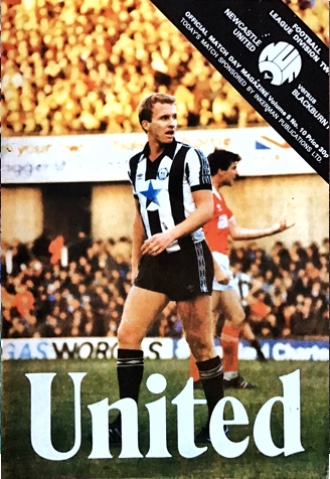
In December Sunderland accepted an offer, believed to be £160,000, for on-loan striker Alan Brown, but the deal collapsed sparking a war of words between the local rivals. According to United he failed a medical due to his troublesome hamstring. But Sunderland Chairman Tom Cowie claimed Seymour had informed him that the bank was not prepared to fund the move and asked if they could extend his loan.
Due to the escalating Falkland Islands crisis, Newcastle banned Mick Martin from playing for Eire in Argentina in May 1982.
Sixteen-year-old Paul Ferris became the club’s youngest ever player when he replaced Waddle towards the end of the match against
Chris Waddle netted the clubs 5,000th League goal in the defeat at Norwich in September.
In October Newcastle Supporters Association Chairman Malcolm Dix launched a Buy-a-player fund which he hoped would raise £100,000 by Christmas, through donations from fans and fund-raising activities. Arthur Cox gave his full support and offered his help in a consultancy role and Jackie Milburn agreed to join the Committee. But by the end of November it had become clear that the Fund was proving a “monumental failure”, with a mere £235 being raised and not a single company making a donation. The fund was wound up at the end of March with little more than £1,000 having been raised. The money was passed to the club to help with youth development.
Newcastle were still paying the wages of Frans Koenan despite the fact that he was released at the end of last season. Initially a Football League investigation concluded that United no longer needed to pay Koenan. But he enlisted the help of the PFA and convinced the League that he was trying his best to find a new club and therefore United were instructed to start paying his wages again. Exeter have turned down the chance to sign him. A few weeks later they gave him a free transfer.
Cox blasted non-League Consett after a United team played them, complaining that “their rough-house tactics were a disgrace” and stating that “they will never again get any assistance from Newcastle United”.
In the home match against Rotherham Newcastle wanted to substitute Kenny Wharton with Alan Shoulder, but don’t have the necessary number boards to hand.
At the final whistle in the home game against Blackburn Rovers physiotherapist Tony Long threw his sponge bag in the air in “delight” wetting some United supporters. A complaint was made to the police who interviewed him.
A streaker made an entrance prior to the home tie against Grimsby in the FA Cup.
When Newcastle played at Luton David Mills was injured in an after-match scuffle with Mal Donaghy which started in the tunnel. Then when the team reached their dressing room they discovered that £600 worth of property (including cash, watches and personal documents) had been stolen.